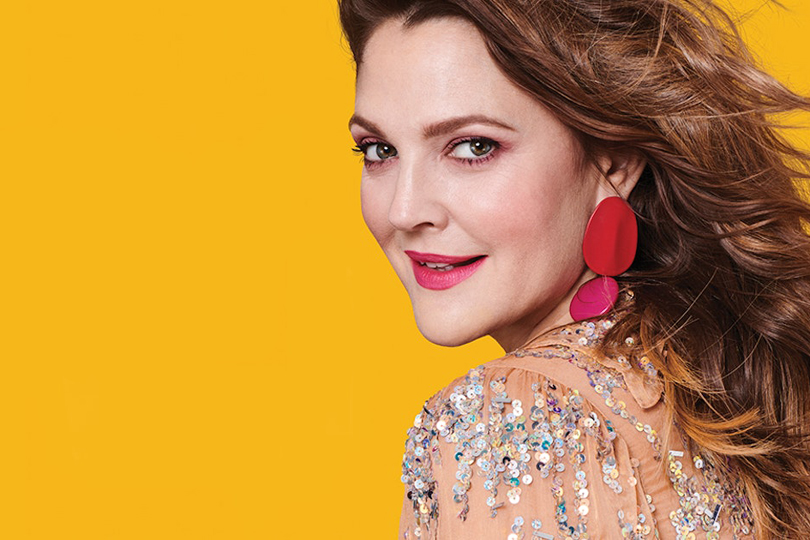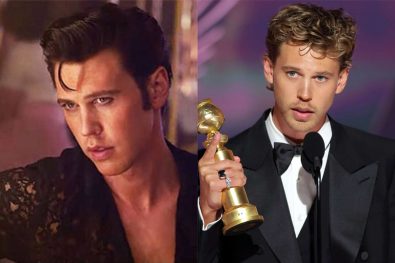By Michele Yeo
Daytime television is a crowded landscape that has left many a canceled show in its wake: Kris Jenner, RuPaul, Megan Mullally, Queen Latifah, and Harry Connick Jr are just a few personalities whose afternoon tenure was short-lived despite finding success previously in other mediums. Even being a seasoned television host or longtime TV personality doesn’t inoculate you from being sent to the daytime graveyard – just ask Meredith Viera, Katie Couric, or Anderson Cooper. So when it was announced in 2020 that Drew Barrymore would be coming to daytime television with an eponymous talk show, expectations weren’t super high. And, in fact, the early reviews were pretty tepid with many critics charmed by the star, but ultimately confused about what the show was trying to do, describing it as “chaotic” and “unhinged.” Saturday Night Live spoofed it, laying heavily into Drew’s trademark quirkiness, while an early Variety reviewer opined “speaking as a Barrymore fan who was excited to see her in conversation – there is yet untapped potential for her to dig deeper, to show us more of what she really believes or finds important.”
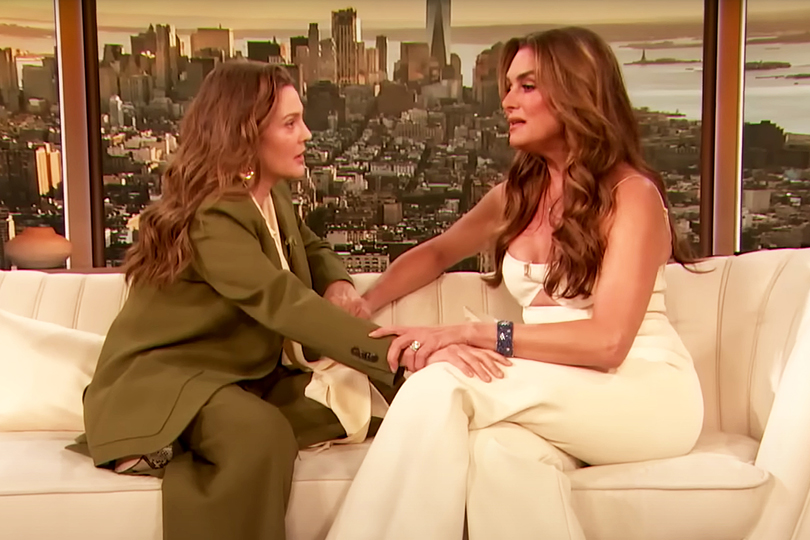
But now, in its third season with a fourth already secured, it’s safe to say “The Drew Barrymore Show” has dug deeper and found its way. And that way is an afternoon therapy session the likes of which we’ve never seen in daytime. Just look at Drew’s recent interview with fellow former child star Brooke Shields who was on the show to promote her new documentary Pretty Baby: Brooke Shields From the jump Drew held Brooke’s hand, sat super close to her, with her other hand on Brooke’s knee. What unfolded was a candid, no-holds-barred conversation about their childhoods in the spotlight, their complicated relationships with their mothers, and their subsequent adult traumas that was so intimate, it made viewers feel like they were spying on a conversation between two longtime friends in one of their living rooms.

But the Brooke Shields interview isn’t unique. Drew has “gone there” with several guests. Another example is her interview with Machine Gun Kelly where he confessed he was “having a really weird day” and that he hoped he wasn’t coming off “cold or shy” explaining “I’m a little insular and I’m just having an odd day.” The singer said he was tired of smiling when he wasn’t having a good day but felt pressured to convey joy because he didn’t want to come off as “ungrateful” to fans. MGK offered to let her lighten the mood and said he’d be up for some silliness but instead, Drew immediately put her guest at ease, assured him he was in a safe space, and rather than resort to games or inane trivial questions to avoid awkwardness, Drew leaned into it, telling MGK about the terrible place she was in after her divorce and how she had to build herself back up. The fact this display of dual vulnerability happened while MGK was painting Drew’s nails made it feel even more personal and like you were eavesdropping on the pair.
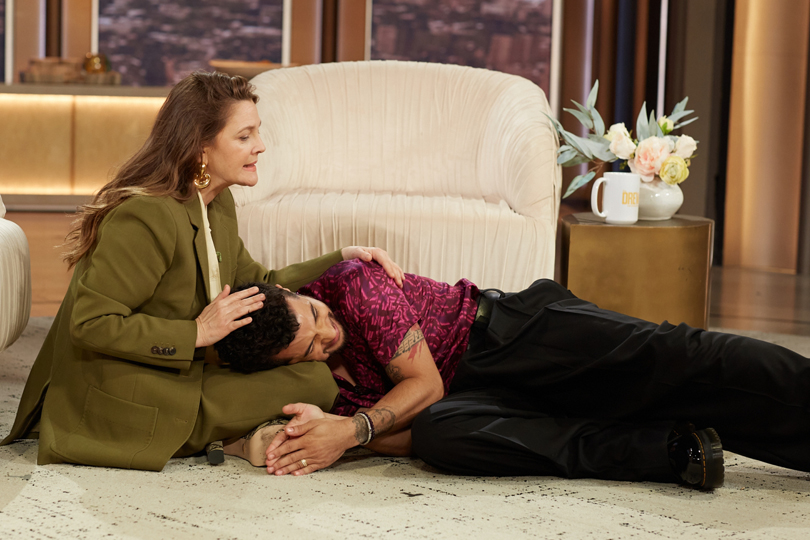
Actor Jordan Fisher recently stopped by the show to chat about his Broadway run on “Sweeney Todd” and it wasn’t long before the two were on the floor holding hands like old longtime friends. During the interview Jordan revealed he had lost 30 pounds from an eating disorder from which he didn’t know he was suffering saying,”I had all of these things that were making it difficult for me to eat and didn’t realize they were all these traumas from my childhood that I needed to work through in therapy.” The revelation was the first time he had mentioned his diagnosis publicly. “I’ve actually never talked about this out loud on a platform like this at all.”
Through her gentleness, earnestness, the wearing of her heart on her sleeve, and her gift of listening (she rarely, if ever, talks over her guests or interrupts them) Drew Barrymore has created not only a safe space, but a talk show like no other. The show has become a regular therapy session of sorts without the $250 an hour price tag.. “We started here in a pandemic and everybody was terrified,” Drew said during her MGK interview, “and I think this show, this space was born in a time where we get to keep it very real and be honest and you can feel that in the room and feel safe.”
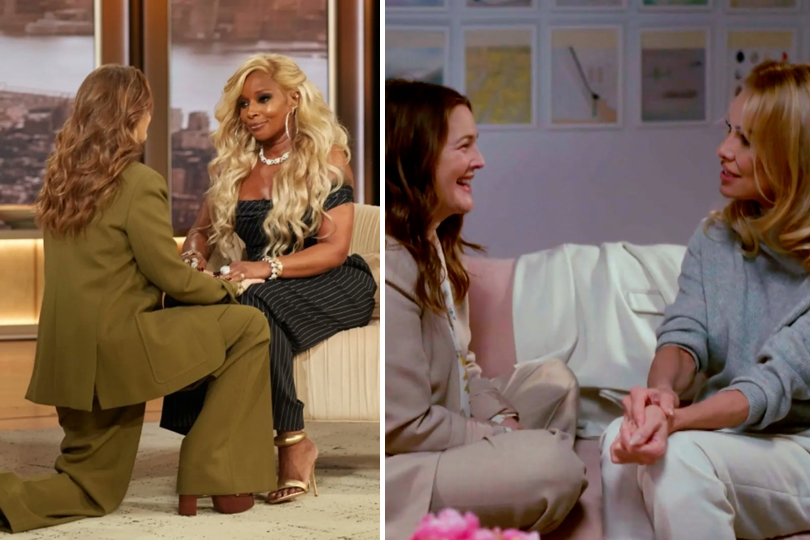
Yes, Oprah may still be the gold standard, and, for many years, Ellen reigned as the Queen of fun and frivolity after Rosie O’Donnell stepped down, but Drew is something else and is entirely in her own unique lane. With all due respect to her newfound sobriety, Drew Barrymore gives the vibes of that drunk girl you meet in the bathroom of the club at 2am. No one is more your champion than that girl, no one hypes you up more than that girl. That’s Drew. And while her approach may not resonate with everyone – recent interviews with Mary J. Blige (where Drew got on her knees in front of the Queen of Hip Hop Soul) and with Pamela Anderson (where Drew began sobbing about motherhood) appeared to make them slightly uncomfortable or that their personal space had perhaps been invaded, Drew remains unapologetically herself. And we wouldn’t change a thing. You do you, Drew.

